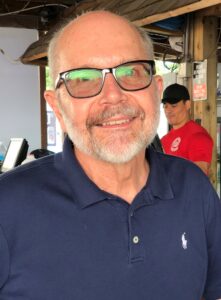Trust is Essential: The Bedrock of the Re-ED Principles
Cont ributed by Kenneth Siemen, Director, Staff Development
ributed by Kenneth Siemen, Director, Staff Development
At Positive Education Program it is difficult to overstate how important the philosophy of Re-ED and its principles are. All our work with young people is grounded in this strengths-based approach. Re-ED’s architect, Dr. Nicholas Hobbs, outlined 12 principles to support the philosophy. Each of the principles play a big role in our day-to-day work, but none of them would be possible without the second principle: trust is essential. Trust is the bedrock on which the others are built, and at PEP, this reverence for trust is infused in everything we do.
So often, when we think of Re-ED or its principles, we think of how they relate to our work with the young people we serve. Research shows that trust between the child and adult is a fundamental feature in the child’s growth and success. We’ve witnessed this in our own work time and again. Children who have experienced trauma cannot begin the hard work of healing until they trust the adults who are supporting them.
As a long-timer at PEP, one thing that is clear to me is that Re-ED is more than just an approach for working with children. It is a philosophy that guides our work more broadly – with each other and with our partners.
Trust Among Staff is Key
Many years ago, when I was a principal at one of PEP’s Day Treatment Centers, I agreed to hold a dance party for students from two centers. When staff presented the idea to me, I felt uneasy. It was not a decision to be made lightly. First, it had never been done before. I knew many of the students didn’t have the social skills necessary to manage this type of activity. Others were not permitted to attend social events in their home school districts because of behavior challenges. The list of things that could go wrong ran on a loop in my mind.
Yet, I knew my team was passionate about providing positive experiences for our kids. I knew they were experienced and competent. They were capable of creating a realistic plan and putting all the pieces in place. I trusted them. With Re-ED’s principle “trust is essential” as my guide, I said yes.
It turned out to be the right decision. The team scheduled the dance for Valentine’s Day, which gave the team several months to plan. The two groups of students who would participate in the dance had initially met to do community service activities together. My team continued to bring the groups together so they could continue building the relationships they’d formed. Classrooms hosted dance practices. Teacher-counselors explained expectations. Everyone was excited for the big event.
When the day finally arrived, the party was a huge success. It provided a wonderful and enriching opportunity for students. These young people had rarely had the opportunity to participate in “typical” high school social activities and this was a big deal for them. The successful party launched a cherished annual tradition at PEP that lasted 20 years, an annual Valentine’s Day dance that included students from all our programs.
Beyond Our Doors, Trust is Essential
“Trust is essential” applies to PEP as an organization, as well. Throughout its 50-year history, PEP has worked to build trust in the community. As we know, trust is developed by continuously delivering on the promises that are made. At PEP, that means we continue helping a child and family, even when the case is very challenging. It means we willingly share our expertise with partners. It means we are always adapting to meet the community need when it comes to young people. Thanks to this commitment, PEP has earned a reputation as an organization stakeholders can count on to deliver competent, evidence-based, effective services.
Several years ago, PEP faced a major hurdle and this community trust served us well. One of its programs, PEP Connections, was at-risk of losing its funding because of state-level policy changes. But the community relied on PEP Connections. They trusted our evidence-based work and saw the positive outcomes we achieved.
As news of the potential consequences of the policy change spread, there was a groundswell of support for PEP from our community partners. This advocacy was a crucial and it worked. Support from the community, along with PEP’s own advocacy, resulted in continued funding, ensuring PEP Connections remained a viable and valued community asset. This outcome was possible because of trust. Once again, trust proved to be essential for PEP.
Conclusion
“Trust is essential.” This statement has been a key part of who we are for 50 years. Over time, PEP has evolved, adopting a comprehensive model of trauma-informed care, embracing Sanctuary and the Neurosequential Model to guide its work. Yet, Re-ED remains the bedrock of what we do. The philosophy’s strengths-based, compassionate, and growth-oriented mindset shapes PEP’s organizational culture as well as its treatment approach for the work with children and youth. It infuses PEP’s work practices, guides its relationships with external partners and serves as the “North Star” in its work with youth.
Frank Fecser, PEP’s former chief executive officer, described Re-ED in this way, “It begins with an attitude of unconditional caring – and not just for troubled and troubling children, but for all people.” This attitude, nurtured by trust, continues to sustain PEP as the exceptional and highly esteemed organization that it is.
